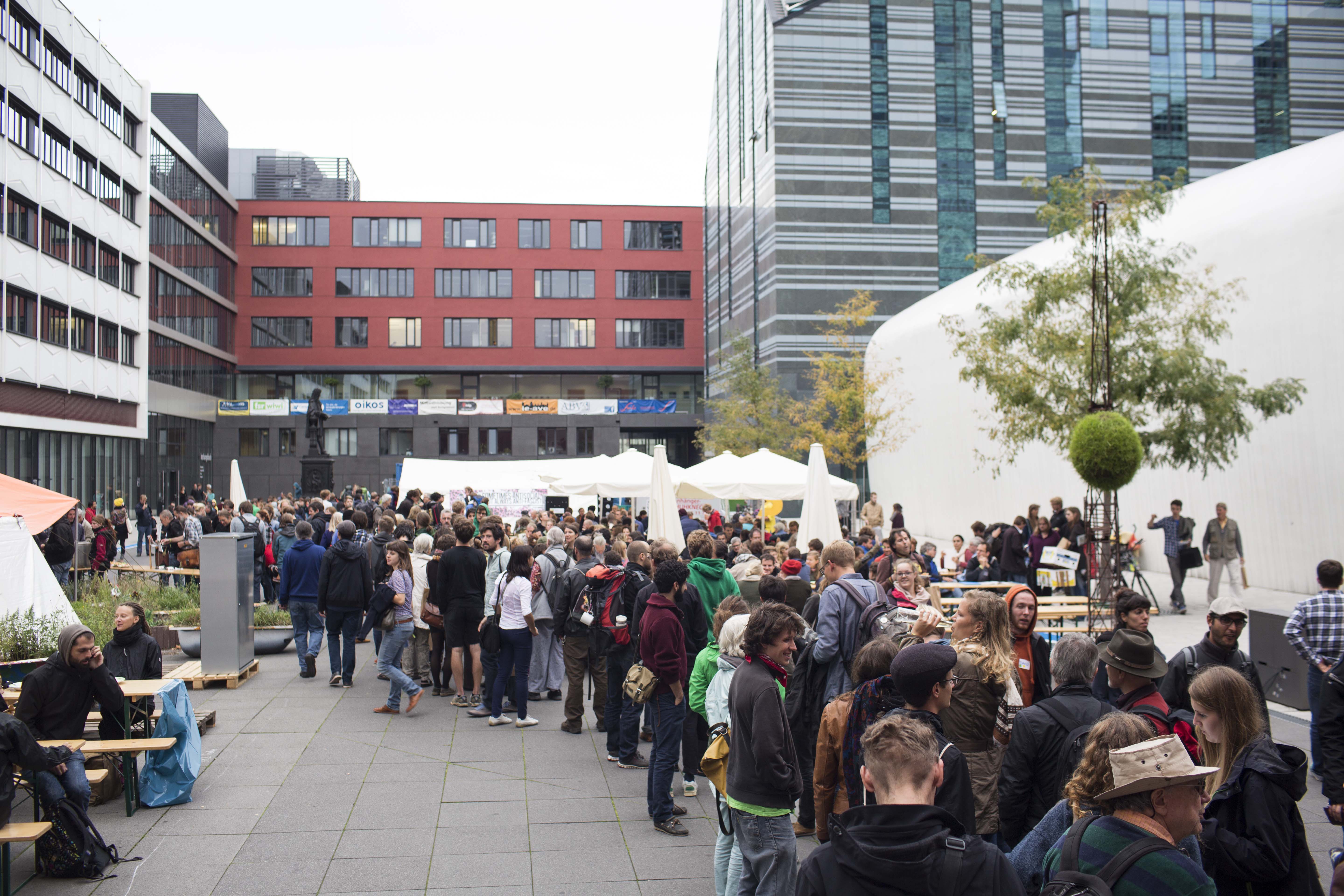Well, that was an interesting week! After publishing two rebuttals of the eco-modernist manifesto, I got swirled into twitterlandia, and exchanges with an amazing cadre of characters.
First came the leaders of the Breakthrough Institute, with whom I had civilized conversations about the GDP of Japan and whether it is growing or not; the energy return on investment (EROI) of solar vs. nuclear energy; or -at the late hours and over a virtual beer among pals - about life in Fukushima and how it compares to the African countryside.
Next came the army of science wonks with ‘kick-ass’ degrees. They flooded me with studies I did not know. Meta-analyses proving that nuclear is safe and clean. Graphs showing increasing numbers of whales, rabbits and rats (proof of decoupling if you were wondering). I would cherry-pick studies against theirs, and they would throw more cherries in response. I decided to stop. Not because of back pain from cherry-picking, but because I realized that my interlocutors were fellows of the Breakthrough Institute doing their job, unlike me wasting my time on twitter.
And then came a circus crowd, straight out of a Fellini movie. People with nicknames like‘Thor’ (a super-hero of Thorium, whose motto is ‘nuclear energy? Yes, please!’). They called me ‘enviro’. They informed me that Fukushima has lower levels of radioactivity than the French Riviera. That they would move there if only I paid for their trip and Japanese language classes. At their most artistic, they would post pictures of Fukushima looking like a forested Eden. At their most touching, they would post retro, night-view photos of American nuclear reactors from the 1960s.
Getting to know this parallel universe of ‘nucleos’ can be depressing. After all, no matter how hard I work and no matter what I write, I don’t think I can ever convince a guy called ‘Thor’ about the merits of degrowth.
On the positive side though, at long last these meditation classes I took at Berkeley years ago paid their cost off. ‘Take a deep breath in … now, slowly, out…’.’Release the anger in you’. This spared me the trouble of tweeting pictures of Fukushima in flames, or inventing fake characters like ‘Rastafarian Bambi’ to start insulting ‘Thor’.
And, yes, I also did learn a lot this week.
Not least I came to better understand the eco-modernizers’ thesis. This can be summed up in three words: ‘nuclear, nuclear and nuclear’. The terminology of ‘decoupling’ and ‘dematerialization’ had confused me.This manifesto is not the standard call for energy efficiency. Neutral terms such as ‘centralized and clean energy production’ are just euphemisms. No, this is a call for substituting fossil fuels with nuclear energy, pure and simple. Producing an abundant and unlimited source of energy in centralized reactors will let the economy grow unstoppably - here and in the rest of the world that most needs it. Carbon will be unnecessary and left aside, and land spared for wildlife. All the rest (urbanization, the critique to conservationism, etc.) are secondary afterthoughts of the manifesto, which stands or falls upon its nuclear thesis.
This thesis is a fantasy of the nth order as I was at pains to argue in 5-word tweets. Of course, if an energy alchemist’s dream came true and we found an unlimited, clean and safe source of energy, we could spare humanity most of the natural and social ills! The only problem is that this is not how the real world works. Previous ‘substitutions’ (from forest trees to fossil fuels, or the mythical one from whales to kerosene that the eco-modernizers love the most) did not reduce environmental damage; they scaled it up. Forests spared, climate screwed. Georgescu-Roegen’s key insight was not that there are entropic limits to growth (even if there are, they are not that relevant for our time frame). It was that increasing rates of energy use unavoidably speed up disorder, aka ‘entropy’. Oil, which seemed comparatively ‘clean’ when first found, disordered the climate. The disorder nuclear radioactivity will bring is not hard to guess.
Even if the wonks were right and nuclear power till now had been proven ‘safe’ (sic), the number of accidents stands only to increase with an exponential growth of reactors. Consider also the implications from an expansion of nuclear reactors beyond the most advanced economies where they are currently located or countries like Ukraine where they currently rot, to non-nuclear countries like Greece, or most of Africa and Latin America (necessary for the manifesto’s vision of the rest of the world growing and converging with an abundant source of energy other than oil). I can´t even begin to imagine the risks involved in assuming that, from here to eternity, all countries will have the capacity to deal with nuclear reactors, their dismantlement and their wastes. Not to mention the changes in social relations and the new forms of colonialism involved in exporting complex nuclear technologies to the ‘less developed’ parts of the world.
Of course, such reasonable arguments cannot convince retired engineers who dream of living in Fukushima and who find white suits and protective masks beautiful. I didn’t know how close to the truth I was when I wrote about a ‘desire’ for nuclear energy in my last post. Without any intention to psychoanalyze, this is a desire strongly linked to a modern imaginary of control, of the powerful male engineer controlling unruly feminine nature to his whims.
But what about the ‘eco’ – modernizers; those for whom nuclear is not the goal in and of itself? They, I think, reach the logical conclusions of the absurdity of wanting both to protect ‘nature’; and refuse, in line with the prevalent thinking of modernity, to accept any ‘limits’. This position cannot be sustained without recourse to the fantasy of an infinite and clean source of energy, be it nuclear (for Breakthrough’s eco-modernizers) or solar and wind (for green-growthers). It has to be something, and this something has to be true. If not, they would have to think the unthinkable, a world without perpetual growth, a world with limits.
What I also learned this week is that we who call ourselves ‘political ecologists’ need to do much more work in clarifying what we understand by ‘ecologists’. My motivation for writing the two pieces was in fact not to convince the Breakthrough crowd, but to make sense of how is it possible that people whose work I admired, like Bruno Latour, came to associate themselves with the Breakthrough Institute. Could it be that we have such diverse definitions of what it means to be an ecologist? Ecologists in support of nuclear energy? The very foundation of the ecologist movement was its opposition to nuclear power.
If ‘ecology’ is not about preserving frogs and pine trees in some pristine and stable state free of human influence - a state that we agree does not exist and never has -, then what is it? Here I mean ecology in a normative sense. Similar to our concern with what is ‘the political’ in political ecology, we need to also ask ‘what is the ecological?’ My pieces hinted to ecology as a different quality and structure of connections among humans and between humans and non-humans. And to Cornelius Castoriadis’ thesis that ‘ecology is not ‘love of nature’, but the need for self-limitation (which is true freedom) of human beings …’. But no doubt, I have much, much more homework to do. If I find time from twitter that is.
What is capitalism? A kind of state? An institution? Some values? A power structure? Ideology? A Culture? What governs capitalism? Supply and demand Invisible hand Enclosure of land The drive to expand Market mechanism Class schism Racism The moral virtue of productivism. Innovation! Invest! Impress! Progress! Entrepreneurial quest for Technological success in Pursuit ...

Some people object to the concept of “natural capital” because they say it reduces nature to the status of a commodity to be marketed at its exchange value. This indeed is a danger, well discussed by George Monbiot. Monbiot’s criticism rightly focuses on the monetary pricing of natural capital. But it is worth clarifying that the word “capital” in its original non-monetary sense means “a stock ...

By Christiane Kliemann When talking about building alliances - the focus of the third conference day - the issue of equality immediately comes into view, as there are many dimensions of inequality deeply rooted in the current growth-based economic model. In order to overcome this model, all these dimensions need to be addressed and all possible change-agents equally taken on board. Adelhei...